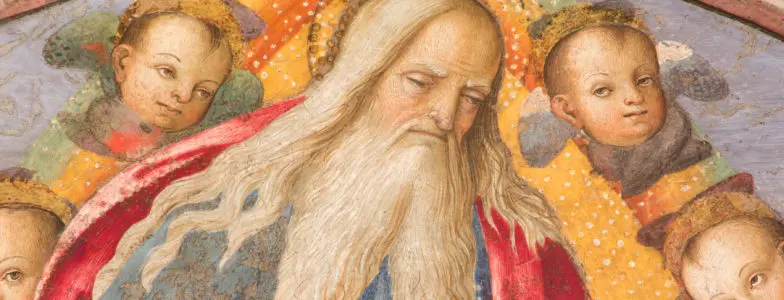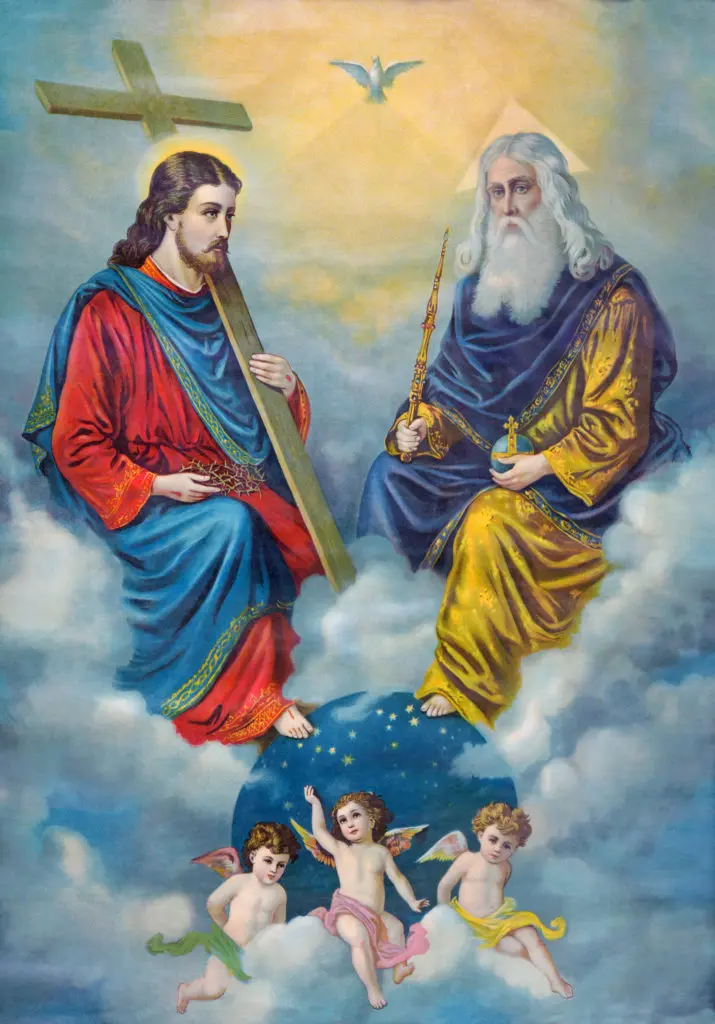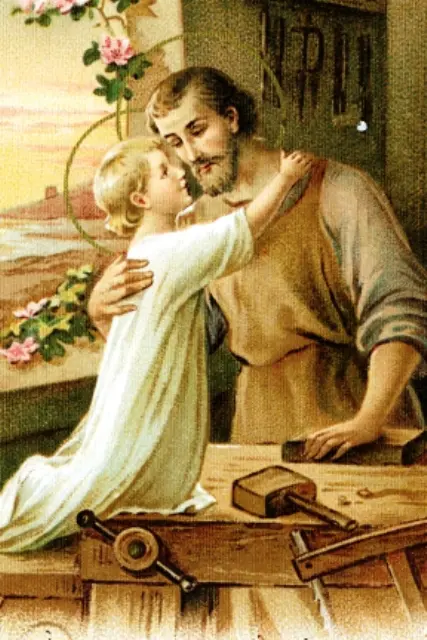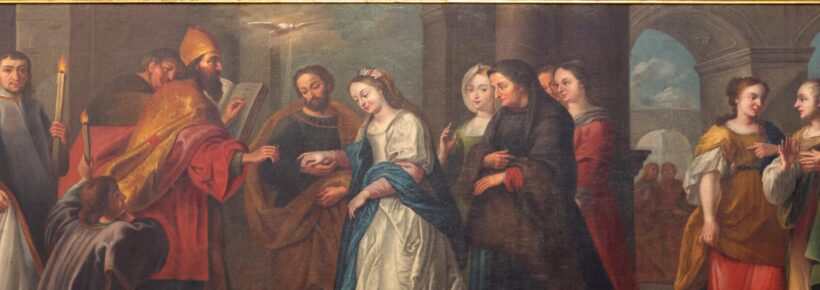God Is “Father” And Not “Mother”
The lack of a true vision of fatherhood is one of the tragedies of today’s culture. At the practical level, we live in a fatherless society. Fathers are not only many times physically absent from their children, they are also spiritually and morally absent as well. To a large extent the very concept of fatherhood is absent from today’s collective consciousness. Modern “gender” ideology denies the importance of what it means to be a man or woman. Concretely speaking, it denies the definition of what it means to be a father or mother. Here we concentrate on the meaning of fatherhood through understanding God the Father.
There is no better way to heal this fatherlessness than to reclaim the vision of God as Father. Christ is the One who best reveals to us what kind of a Father God is. Jesus is the definitive and complete revelation of God and of the First Person of the Most Holy Trinity. And He has revealed that First Person as His Father (see CCC 65). That revelation is critical to healing today’s fatherless society.

God the Father giving his blessing in a painting by Aiuto del Pinturicchio (1489 – 1491)
Precisely because Jesus is the definitive and complete Word of God (see John 1:1), He is also the completion and fulfillment of God’s revelation in the Old Testament (CCC 65); let us take a brief look at what the Old Testament says about God the Father in His paternal role.
First, we find biblically God as Father, as authentically interpreted only by the Magisterium of the Catholic Church (see CCC 85) is that God is called “Father” insofar as He is the Creator of everything that exists (see CCC 238, Deut. 32:6, and Mal. 2:10).
Second, God is also called the Father of Israel, whom He calls his “first-born son,” by virtue of the Covenant He established with His people” (see Ex. 4:22, and CCC 238).
Third, God is also called Father of the kings of Israel. The prophet Nathan addressed David and through him all the succeeding kings by saying “I will be a father to him and he shall be my son” (2 Sam. 7:14). Finally, in a very special way, God is also called “the Father of the poor, the orphan and the widow, who remain under His loving protection” (CCC 239, see also Psalm 68:5). There are scores of biblical references to God, “the Father.”
These, then, are the essential characteristics of God’s fatherhood. As a generous Father and Creator of the world and the universe, He is a provider. Next, He is a gentle yet just leader and a guide, insofar as He is Father of the kings of Israel, who must render an account of their actions to Him (recall the story of David’s double sin of murder and adultery, and God’s forgiveness and punishment). And last, He is a defender and protector of the most vulnerable – the poor, the orphan and the widow being the primary examples.
In such biblical revelation, the Church is teaching us an important distinction:
“By calling God ‘Father’, the language of faith indicates two main things: that God is the first origin of everything and transcendent authority; and that he is at the same time goodness and loving care for all his children. God’s parental tenderness can also be expressed by the image of motherhood, which emphasizes God’s immanence, or the intimacy between Creator and creature.
The language of faith is thus explained by drawing on the human experience of parents, who are in a way the first representatives of God for man. But knowledge of fallen nature also tells us human parents are fallible and can disfigure the face of fatherhood and motherhood. We ought therefore to recall that God transcends the human distinction between the sexes. He is neither man nor woman: he is God. He also transcends human fatherhood and motherhood, although he is their origin and standard: no one is father as God is Father” (CCC 239, emphasis added).
God the “Father” Transcends Any Other Characterization
Observe that God’s Fatherhood points towards His transcendence; while His “motherhood” points towards His immanence. God’s transcendence refers to His total otherness. God is infinitely superior and qualitatively different in His being than anything He has created. But though He transcends us, this does not mean being distant or indifferent to His creatures. In fact, He is intimately present in them, continuously imparting to them love and life. God is everywhere present, but dwelling within him are the qualities He has imparted to us, that is, immanence.
Therefore, according to Church teaching, God’s “motherhood” is an aspect or image of God’s immanence; while God’s Fatherhood refers to His being. God is Father. The biblical justification for this will become clearer when we explore Jesus’s revelation of God as His Father. But, for now, we can make the following reflection. If God is not transcendent He is not God. If he did not transcend all those qualities contained within Himself but reflected in us, the Godhead would collapse unto His creation, and we would fall into the heresy of pantheism (where everything is “god”). Therefore, He reflects motherhood as an image, beautiful and valid, but Fatherhood is truly God Himself. (See Manfred Hauke, Women in the Priesthood? San Francisco: Ignatius Press, 1988, pp. 221-225.)
Naturally, it follows that inclusive language or characterizing God as female is inherently wrong. These are God’s words he chose to call Himself, not something based in human experience which makes us call God “Father.” Stemming from God’s Fatherhood is an archetype embedded in our collective psyche. Saint Paul pointed to this truth when he said: “This, then, is what I pray, kneeling before the Father, from whom every family, whether spiritual or natural, takes its name” (Ephesians 3:14, emphasis added). Human experience may come first and the realization that God is Father may come second. But in seeking the truth, our existence naturally leads us back to God, who is first..
Christ Reflects God the Father

Holy Trinity printed image in Germany the end of the 19th century.
Now we turn to the New Testament to explore why Jesus called God the Father and its implications. As we said at the beginning, Jesus is – in His own person, words, and deeds – the culmination and fullness of God the Father’s definitive self-revelation to humanity (see again CCC 65, and also Hebrews 1:1-4).
Regarding this, the Church teaches us that “Jesus revealed that God is Father in an unheard-of sense: he is Father not only in being Creator; he is eternally Father by his relationship to his only Son who, reciprocally, is Son only in relation to his Father: ‘No one knows the Son except the Father, and no one knows the Father except the Son and any one to whom the Son chooses to reveal him’ (Matthew 11:27).”
God’s Son is eternally begotten. Also, extending the relationship to the Holy Trinity – three in one – we know Christ as the Son of God is also mysteriously a reflection of God the Father. As the culmination and fulfillment of the Old Testament says: “To have seen me has is to have seen the Father” (John 14:9).
Therefore, the way to heal today’s culture of its fatherlessness is not to give in to the disfigurement fatherhood has suffered or deny it based on a diabolical “gender” ideology, but to restore it. And the best (and only) way to restore it is to read, meditate and apply the Gospels!
Imitating the Virgin in Championing Fatherhood
In his catechesis on the theology of the body, Saint John Paul II said that God has entrusted to man the care of the man-woman relationship. Woman has been given–entrusted to man, not because she is “inferior”, but because that’s the role God has intended. Whereas man is the guide, provider and protector (mirroring traits of God’s transcendence); woman is the dynamic prototype of what it means to be gentle, loving, full of wisdom, detailed and multi-task oriented, balanced and a giver of life (immanence – see Proverbs 31).
Man becomes more himself before woman, and woman likewise before man. Made by God for one another, this complementarity extends far beyond marriage but everywhere else! Mary’s fiat allowed God-made-man to come into the world through the Father and Holy Spirit. She was not a mere vessel for Jesus, she was his mother: she bore him in her womb, breast fed him, sang to him to sleep. She taught Him first words, including the first Old Testament verses, while Saint Joseph as foster Father supported and protected them both and continued His earthly education (see Luke 2:51-52). And later, she accompanied Him courageously at the foot of the Cross, when most of His Disciples ran away in fear (John 19:25).
Let us then recapture, by means of God’s Word, the true vision of manhood and fatherhood, as well as that of womanhood and motherhood. Only then can our present culture, which is foolishly and in a suicidal way walking toward the abyss, redirect its course and come back to God the Father.
Related Content
Adolfo is the Director of Education for Hispanic Outreach for Human Life International and of HLI's Hispanic outreach arm Vida Humana Internacional. He has a Masters in Theology from St. Vincent de Paul Regional (Major) Seminary and a License in Moral Theology from the Alphonsian Academy in Rome.
Adolfo has traveled frequently to VHI’s affiliates in Latin America to give talks, training sessions, and media interviews. He has authored and co-authored books, articles, reports, and a pro-life training course for Hispanics in the U.S. Adolfo has also participated in the production of two TV pro-life series in Spanish, which have been aired through EWTN en Español.











